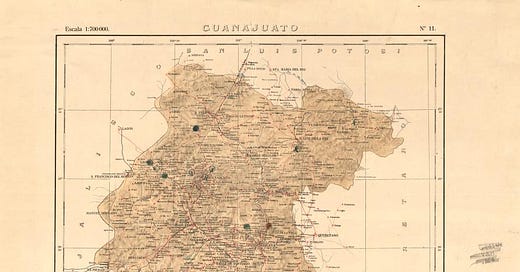I wrote this account of what I did on March 6, 2024, that evening.
High on the hills above the picturesque colonial city of San Miguel de Allende—the birthplace of the Mexican War of Independence—sit lavish villas with gardens and courtyards. In one such garden today, I socialized with a cohort of well-dressed and well-spoken elderly Americans, Canadians, Brits, and Frenchmen, and at least one woman from Mexico City, who were attending a house concert of classical music—a piano and flute duet. I was there visiting my grandma on spring break. She had invited me to the party. We were served shrimp, mushrooms, and nuggets of fried ham by extremely generous local caterers. As we sipped prosecco and discussed our careers and alma maters1, a quartet played in the corner—the pre-concert.
Earlier today I was in Celaya, the city with the highest murder rate in the world in 2023. Celaya is fifty kilometres south of San Miguel, a one-hour drive. My grandma’s friend volunteers there weekly and had invited me to join him. In Celaya I visited ABBA House, a shelter for migrants, mostly from Central and South America, who are on their way to the United States. The vast majority of the residents at ABBA House today were long-term, though. They had been severely injured or handicapped (by falling off moving trains2, for example) and couldn’t go on. Many were missing limbs.
From the street, ABBA House is guarded by tall white walls and a large gate. It’s well marked: ABBA is painted on the wall, along with the logos of Oxfam Mexico, the Red Cross, Propuesta Cívica, Servicio Jesuita a Migrantes, the European Union, and other organizations. When you hit the buzzer next to the gate, a guy lets you in (granted that you look safe). When you pass through the gate, you enter into a courtyard with a long table and chairs, surrounded by a shelter with cots. There’s also a house, in which there’s a kitchen, an office, and a room for long-term residents with severe handicaps to stay in. Little children ran up to hug our legs and greeted us when we entered. In the courtyard, people were sitting, smoking, aimlessly waiting. But the children were joyful.
I played ping pong with a dude my age. He was quiet and kinda sad looking, but I thought he enjoyed playing with me. We couldn’t communicate much. I played Jenga and tic-tac-toe with a little girl who must have been seven or eight. We also drew some, and she taught me the words vaca, oso, and abeja.
The only person there today who wasn’t a long-term resident was a guy from Honduras who was making his way to San Antonio, Texas. He planned on leaving the next day to travel north. Another guy was actually headed south, going back to Honduras to his kids and wife. He told me the names of his three sons, the youngest of which was named after him.
At the party, we ate appetizers and sipped wine in the yard, listening to the pre-concert. We then moved into a roofed portico to watch the concert. There were probably fifteen of us in total. After the concert, we moved inside to eat ice cream and cake and chitchat. The host was a very aristocratic Brit. He wore light blue pants, a light blue button-down shirt, and a blazer (I think it was blue as well). He also sported a humongous bow tie and a ponytail of white hair. On his coffee table were personal invitations to a royal regatta, a royal horserace (the Ascot), and the coronation of King Charles III and Queen Camilla.
The fancy party was lots of fun and I enjoyed the music.
One woman at the party, who seemed to be the host’s date, was from Mexico City. Her vibe was Sofía Vergara but fifty-five years old. She wore a fiery red dress and lavish, heavy jewelry and lots of makeup. I tried to explain to her what I had done earlier today in Celaya. The distance between us, the noise of the party, and the fact that I was speaking to her in English, her second language, led to miscommunication. She congratulated me for helping feed the needy, stray dogs of Celaya. I said, “No. Son migrantes. Son personas migrantes de Honduras.” No son perros.
For nerds and the Pope: almae matres




